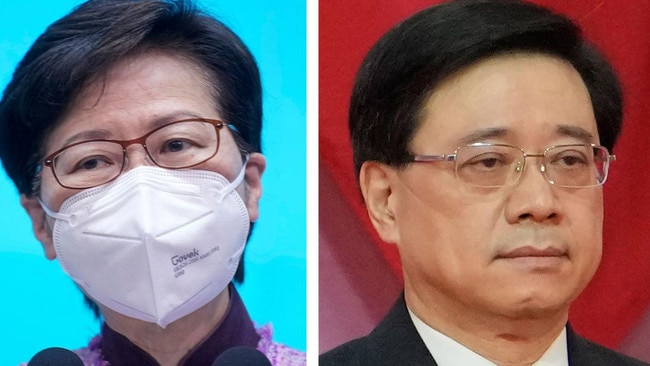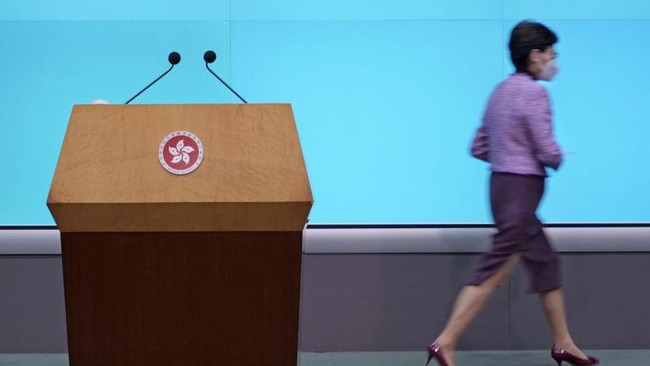Carrie Lam will not seek second term as Hong Kong leader
Carrie Lam will end five turbulent years in power, raising the prospect the territory will slide further towards a police state.

Carrie Lam, the leader of Hong Kong, has said she will end five turbulent years in power, raising the prospect that the territory will slide further towards becoming a police state.
Lam, 64, said she was prioritising her family and felt it was time to leave office, insisting the role of chief executive had been her “sole consideration”. Her term has been marked by a steady erosion of freedoms under the Beijing-backed government.
It brings to an end months of speculation over whether Lam would seek another term. When she told the mainland she was stepping down, Lam said yesterday the news was met with “respect and understanding”.
Her successor will be picked in May and John Lee, the city’s security chief during the 2019 protests and now Lam’s deputy, is being touted as a possible frontrunner. Lee, who has no expertise in economics, business or social affairs, is a former policeman, whose career in government has focused exclusively on matters of security. If he is chosen by the Chinese government as leader, it will reinforce the sense of many in Hong Kong that it is on course to become a de facto police state.
Lee, 64, joined the Hong Kong police force in 1977 and became deputy commissioner before joining the security bureau. He was appointed minister for security by Lam in 2017. During the protests that convulsed the territory two years later, he was uncompromisingly supportive of his former police colleagues, adding to the sense of grievance among protesters.
In the most notorious incident at Yuen Long in July 2019, police turned a blind eye while scores of thugs set about passengers at a railway station with metal and wooden sticks after an anti-government demonstration. Lee defended the police action.
Last year Lam appointed him chief secretary, her No 2 - the post from which she was promoted to chief executive. During the demonstrations in 2019, he had followed Lam closely by first insisting that a new extradition law must be passed, then abandoning it, while apologising “for the controversies and rifts it has caused in society”.
Lam’s popularity has declined sharply during her term, particularly over the legislation that would have allowed crime suspects to be extradited to mainland China for trial; protests that engulfed the territory, and Beijing’s national security law, which has been used to imprison opponents and stifle dissent.

Lam avoided questions about her legacy yesterday (Monday), saying it was not yet time to reflect on her experience in public service as the pandemic, still ravaging local communities, was “of paramount importance”.
In 2021, China stepped up its proestablishment drive, overhauling Hong Kong’s electoral system to ensure only “patriots” could rule the territory.
The election for the chief executive has been postponed until May 8 because of the worst Covid-19 outbreak of the pandemic. On Sunday 3,709 new cases and 111 deaths were reported. The latest wave has infected 1.2 million peole and claimed 7,959 lives.
Indecisive Lam was paralysed in struggle between Beijing and Hong Kong
The wonder is not that Carrie Lam is quitting, but that she lasted this long (Richard Lloyd Parry writes). Twice as chief executive she has faced historic crises. Twice, her poor judgment and unsympathetic style made things worse.
The first debacle was in 2019 when opposition to a new extradition law exploded into a mass democracy movement that brought millions to the streets.
The pressure got to Lam who, foreign diplomats say, was tearful in private meetings. Many people expected her to become the fourth out of four leaders to exit mired in controversy. But incompetent Hong Kong chief executives cannot be blamed on the poor judgment of voters. They are chosen by Beijing, and losing another would have signalled weakness. Lam, in any case, was almost irrelevant in the struggle between China and the army of democracy activists.
The draconian national security law that followed in effect quashed the protest movement, letting Lam reset her leadership just in time for Covid.
Hong Kong had a fairly good pandemic until this year when it suffered one of the worst waves of infection in the world. Having failed to vaccinate its elderly, the territory at one point had the highest death rate anywhere. Lam announced mass testing, then changed her mind, and continued to dither until Beijing sent in its own experts.
Her decision not to seek a second term allows it to be said that she is retiring at the request of her family. It also enables a fresh start with a new leader, though one who will be little more than the local face of a government in thrall to Beijing.
The Times







To join the conversation, please log in. Don't have an account? Register
Join the conversation, you are commenting as Logout